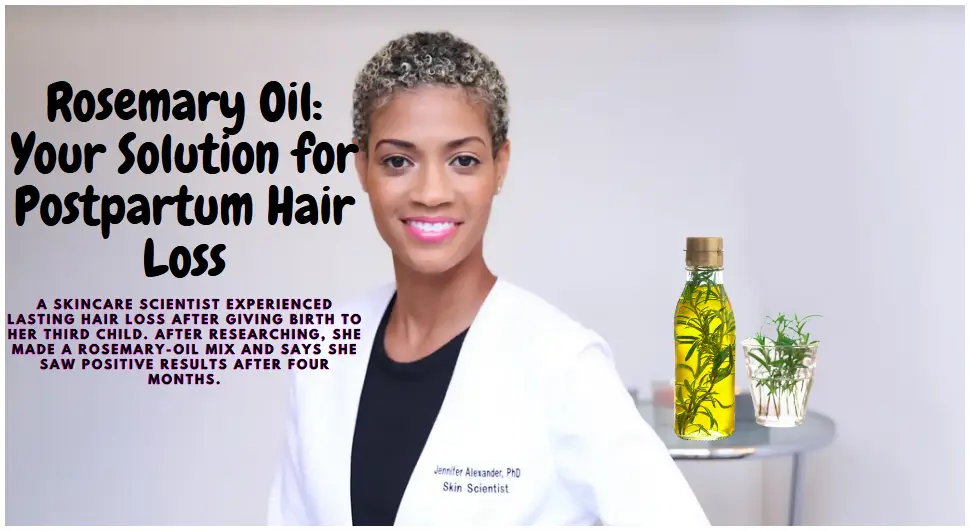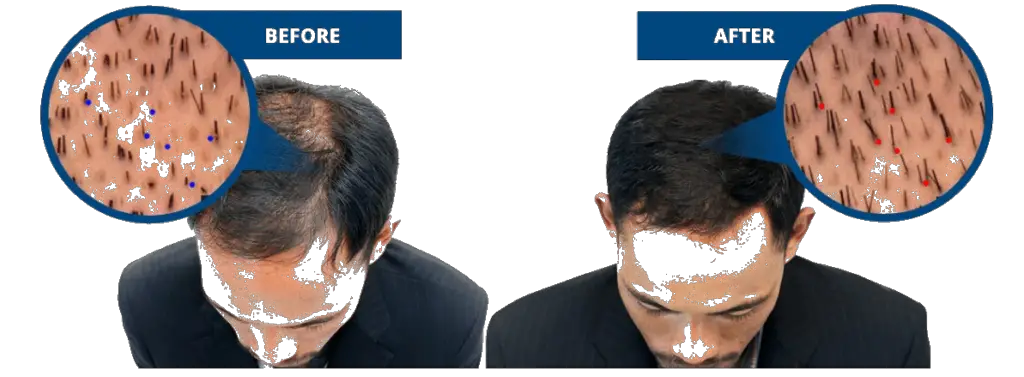Discover the science-backed benefits of rosemary oil for postpartum hair loss. Learn how to make your own rosemary oil and integrate it into your hair care routine.
The journey of motherhood brings immense joy, but it also comes with its share of challenges. One such challenge that often goes unnoticed is postpartum hair loss. After giving birth, many women experience significant hair thinning and loss, a condition that can be both distressing and confidence-shattering. While hormonal changes are the primary culprit, other factors like stress and nutritional deficiencies also play a role.
For those grappling with this issue, there’s a glimmer of hope: rosemary oil. This essential oil has been making waves in the beauty and healthcare industry for its myriad benefits, particularly its effectiveness in combating hair loss. Rich in antioxidants and known for its ability to block DHT—the hormone responsible for hair loss—rosemary oil has emerged as a natural alternative to conventional treatments like Minoxidil or Rogaine.
If you’re wondering about the role of nutrition in postpartum hair loss, you’re not alone. Many women have found that supplementing their diet with the right nutrients can make a significant difference. To delve deeper into this aspect, check out our comprehensive guide on Vitamins for Postpartum Hair Loss. This guide will provide you with actionable insights into how vitamins and minerals can support hair growth and overall well-being during the postpartum period.
What Causes Postpartum Hair Loss?
The phenomenon of postpartum hair loss is far from uncommon, yet it remains a topic shrouded in mystery for many new mothers. Understanding the root causes can provide valuable insights into effective treatment options. The primary factor contributing to hair loss after childbirth is hormonal fluctuation. During pregnancy, elevated levels of estrogen prolong the growth phase of hair, leading to thicker, more luscious locks. However, post-delivery, these hormone levels plummet, causing the hair to enter the shedding phase.
Stress is another significant contributor to postpartum hair loss. The demands of new motherhood—sleepless nights, breastfeeding, and the emotional rollercoaster that accompanies it—can exacerbate hair thinning. Stress triggers the release of cortisol, a hormone that can disrupt the hair growth cycle, leading to increased shedding.
For those seeking a targeted approach to tackle this issue, serums can be a game-changer. Our in-depth guide on Serum for Postpartum Hair Loss offers a curated list of products that are both effective and safe for new mothers. These serums are formulated to combat the hormonal and stress-induced factors contributing to hair loss, providing a holistic solution.
Other factors that can influence postpartum hair loss include:
- Nutritional deficiencies: Lack of essential nutrients like iron and zinc can weaken hair follicles.
- Medications: Certain medications taken during or after pregnancy may have hair loss as a side effect.
- Pre-existing conditions: Conditions like alopecia can worsen during the postpartum period.
| Factors | Solutions |
|---|---|
| Hormonal Changes | Hormone-balancing foods and supplements |
| Stress | Stress-management techniques like meditation |
| Nutritional Deficiencies | Iron and zinc supplements |
So, are you tired of finding strands of hair on your pillow every morning? It’s time to take action. Explore Amazon Serum for Postpartum Hair Loss guide and find the perfect product to kickstart your journey back to voluminous, healthy hair.
The Science Behind Rosemary Oil
The allure of rosemary oil extends far beyond its aromatic properties; it’s a powerhouse when it comes to promoting hair growth and combating postpartum hair loss. But what is the science that substantiates these claims? One of the most compelling aspects of rosemary oil is its ability to inhibit the production of Dihydrotestosterone (DHT), a hormone that shrinks hair follicles and is a leading cause of hair loss in both men and women.
In addition to blocking DHT, rosemary oil is rich in ursolic acid, which stimulates the scalp and rejuvenates hair follicles. This dual action not only prevents hair loss but also encourages new growth, making it a holistic solution for postpartum hair woes.
For those interested in a broader range of natural remedies, our comprehensive guide on Essential Oils for Hair Growth offers a variety of options that complement the benefits of rosemary oil. From lavender to peppermint, discover oils that can be mixed with rosemary for enhanced effects.
Benefits of Rosemary Oil:
- Stimulates Hair Growth: Increases blood flow to the scalp.
- Blocks DHT: Prevents the hormone that causes hair follicle shrinkage.
- Antioxidant Properties: Fights free radicals that can damage hair.
- Scalp Health: Its antifungal and antibacterial properties keep the scalp healthy.
- Shine and Luster: Adds a natural shine to hair when used as a conditioner.
| Benefits | How to Use |
|---|---|
| Stimulates Hair Growth | Massage into the scalp |
| Blocks DHT | Apply directly to areas of thinning |
| Scalp Health | Use as a pre-shampoo treatment |
Are you intrigued by the science-backed benefits of rosemary oil? Don’t stop here. Expand your horizons by exploring Amazon Essential Oils for Hair Growth guide.
Learn how to create your own potent mixtures for a fuller, healthier mane.
DIY Rosemary Oil Recipes
The beauty of rosemary oil lies not just in its efficacy, but also in its versatility. For those who love a good DIY project, creating your own rosemary oil at home can be both rewarding and cost-effective. This section will guide you through various recipes, each designed to target specific hair concerns.
How to Make Rosemary Oil for Hair
Creating your own rosemary oil for hair is simpler than you might think. All you need is a carrier oil like coconut or jojoba and some fresh or dried rosemary leaves. Heat the oil and rosemary leaves in a double boiler for 30 minutes, strain, and voilà, your homemade rosemary oil is ready for use.
Rosemary and Olive Oil for Hair
Olive oil serves as an excellent carrier oil due to its rich antioxidant properties. When combined with rosemary, it not only stimulates hair growth but also combats dandruff and adds a natural shine to your locks.
Rosemary and Argan Oil for Hair
Argan oil is renowned for its moisturizing properties. A blend of argan oil and rosemary can be a godsend for those with dry, frizzy hair, offering deep conditioning along with the benefits of hair growth.
For those who are keen on diving deeper into the world of DIY hair care, our detailed guide to Make Rosemary Oil for Hair offers step-by-step instructions and additional tips for maximizing the benefits of your homemade oils.
Table: Comparison of Different DIY Rosemary Oil Recipes
| Recipe | Carrier Oil | Benefits | Usage |
|---|---|---|---|
| How to Make Rosemary Oil for Hair | Coconut or Jojoba Oil | Stimulates Hair Growth, Blocks DHT | Scalp Massage |
| Rosemary and Olive Oil for Hair | Olive Oil | Fights Dandruff, Adds Shine | Pre-shampoo Treatment |
| Rosemary and Argan Oil for Hair | Argan Oil | Moisturizes, Reduces Frizz | Leave-in Conditioner |
Ready to take control of your postpartum hair loss journey? Don’t just read about it—try making your own rosemary oil blends. For a comprehensive guide, check out our Make Rosemary Oil for Hair article, and discover the joy of DIY hair care solutions that are both effective and natural.
How to Use Rosemary Oil Effectively
So, you’ve got your bottle of rosemary oil—now what? Knowing how to apply it effectively is crucial for maximizing its benefits, especially when dealing with postpartum hair loss. The application method and frequency can significantly impact the results you’ll see.
For scalp massages, it’s best to dilute rosemary oil with a carrier oil like coconut or jojoba. Apply the mixture to your scalp and massage gently for 5-10 minutes. This stimulates blood flow, encouraging hair growth. For a pre-shampoo treatment, mix rosemary oil with a carrier oil and apply it to your hair and scalp. Leave it on for at least 30 minutes before washing it out.
If you’re looking to compare the effectiveness of rosemary oil with other natural remedies, our guide on Castor Oil vs Rosemary Oil for Hair Growth offers a detailed comparison, helping you make an informed choice.
Tips for Effective Use:
- Dilution is Key: Always dilute rosemary oil with a carrier oil to avoid irritation.
- Consistency Matters: For best results, apply at least twice a week.
- Patch Test: Conduct a patch test to ensure you’re not allergic to rosemary oil.
- Time it Right: Leave the oil on for at least 30 minutes for deeper penetration.
- Shampoo Choice: Use a sulfate-free shampoo to wash off the oil, preserving its benefits.
| Tips | Why It’s Important |
|---|---|
| Dilution | Prevents Scalp Irritation |
| Consistency | Ensures Sustained Benefits |
| Patch Test | Avoids Allergic Reactions |
Ready to turn the tide on your postpartum hair loss? Start by applying rosemary oil the right way. For more insights on how rosemary oil stacks up against other oils, don’t miss our comprehensive guide on Castor Oil vs Rosemary Oil for Hair Growth. Make an informed choice and pave the way for healthier, fuller hair.
Safety Precautions and Considerations
While rosemary oil offers a plethora of benefits for hair growth and combating postpartum hair loss, it’s essential to approach its use with caution, especially during sensitive phases like pregnancy and breastfeeding.
During pregnancy, the skin can become more sensitive, making it crucial to conduct a patch test before applying rosemary oil. It’s also advisable to consult a healthcare provider for personalized advice. For breastfeeding mothers, while rosemary oil is generally considered safe for topical use, it’s best to avoid applying it near the breast area to prevent any potential ingestion by the infant.
If you’re looking for a supplement specifically designed for postpartum hair recovery, you might want to consider Nutrafol Postpartum. This product offers a blend of natural ingredients that support hair growth without the risks associated with essential oils.
Safety Tips:
- Consult a Healthcare Provider: Especially important during pregnancy and breastfeeding.
- Patch Test: Always conduct a patch test to check for allergic reactions.
- Application Area: Avoid applying near the breast area while breastfeeding.
| Safety Tips | Why It’s Important |
|---|---|
| Consult a Healthcare Provider | Personalized Safety Advice |
| Patch Test | Prevents Allergic Reactions |
| Application Area | Ensures Safety for Infants |
Concerned about the safety of using rosemary oil during pregnancy or breastfeeding? There are alternative solutions. Check out Amazon guide on Nutrafol Postpartum for a safer, clinically-tested option designed to support postpartum hair recovery.
FAQs
Navigating the world of hair growth solutions can be overwhelming, especially when you’re dealing with postpartum hair loss. To make your journey a bit easier, we’ve compiled a list of frequently asked questions that address some of the most common concerns.
Q: Can you mix minoxidil with rosemary oil?
While both minoxidil and rosemary oil are popular choices for combating hair loss, mixing them is generally not recommended. Minoxidil is a medication that requires precise dosing, and combining it with rosemary oil could alter its effectiveness or lead to unwanted side effects.
Q: Is rosemary oil safe during breastfeeding?
Rosemary oil is generally considered safe for topical use during breastfeeding. However, it’s advisable to avoid applying it near the breast area to prevent any potential ingestion by the infant. For a more comprehensive solution, consider using Nutrafol Postpartum.
Q: How long does it take to see results?
The time it takes to see noticeable results from using rosemary oil can vary from person to person. However, most users report seeing improvements within 2 to 3 months of consistent use.
Quick Tips:
- Be Patient: Results take time; consistency is key.
- Consult a Professional: Especially important when considering mixing medications like minoxidil.
- Safety First: Always prioritize safety, particularly during sensitive phases like breastfeeding.
| Quick Tips | Why It’s Important |
|---|---|
| Be Patient | Ensures Effective Results |
| Consult a Professional | Avoids Adverse Effects |
| Safety First | Prevents Health Risks |
Still have questions? For a more in-depth look at postpartum hair recovery options, check out our guide on Nutrafol Postpartum. It offers a safer, clinically-tested alternative designed to support hair growth during this crucial period.
Conclusion and Takeaways
Navigating the challenges of postpartum hair loss can be daunting, but natural remedies like rosemary oil offer a glimmer of hope. From its DHT-blocking properties to its ability to stimulate hair growth, rosemary oil is a versatile solution worth considering. However, it’s crucial to approach its use with caution, especially during sensitive phases like pregnancy and breastfeeding.
Whether you’re contemplating mixing it with medications like minoxidil or wondering about its safety during breastfeeding, always consult a healthcare provider for personalized advice. For those who prefer a comprehensive, clinically-tested solution, our guide on Postpartum Dandruff offers additional insights into managing hair and scalp health post-pregnancy.
Key Takeaways:
- Rosemary Oil’s Versatility: Effective for both hair growth and dandruff control.
- Safety Precautions: Always consult a healthcare provider, especially during pregnancy and breastfeeding.
- Consistency is Key: Results are best seen with regular, consistent application.
| Key Takeaways | Why It’s Important |
|---|---|
| Rosemary Oil’s Versatility | Multiple Benefits |
| Safety Precautions | Ensures Health and Well-being |
| Consistency is Key | Guarantees Effective Results |
Ready to take control of your postpartum hair loss? Start by exploring the benefits of rosemary oil. For more comprehensive solutions, don’t miss Amazon Carina Organics Sweet Pea Postpartum Dandruff Flake Removal Shampoo, which offers additional reviews for maintaining a healthy scalp and luscious locks post-pregnancy.
Additional Resources
For those who are keen to dive deeper into the science and benefits of rosemary oil and postpartum hair loss, a wealth of resources is available. These materials can provide you with a more comprehensive understanding of the topic, backed by scientific research and expert opinions.
Resources:
- Buy Rosemary Oil
- NCBI Book on Hair Loss
- Cleveland Clinic on Postpartum Hair Loss
- PubMed Research on Rosemary Oil
| Resource Type | Why It’s Important |
|---|---|
| Scientific Research | Validates Claims |
| Expert Opinions | Provides Credibility |
| Product Links | Offers Practical Solutions |
For more in-depth information, consider reading our resources, which offers a comprehensive look at rosemary oil for postpartum hair loss and scalp health during this crucial period.
- AI Powered Bald Filter Online 2024: See Yourself with No Hair! - January 19, 2024
- Harklinikken Bad Reviews 2024: Analyzing Negative Feedbacks - January 18, 2024
- How to Get the Alex Eubank Hair | Step-By-Step Tutorial 2024 - January 18, 2024















